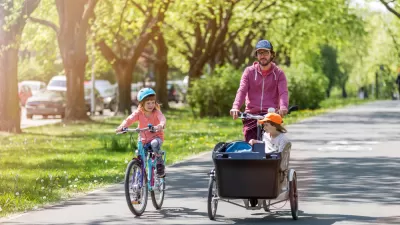The Shweeb is a person-powered monorail that currently only exists as an amusement park attraction in New Zealand. But with a $1 million Google grant, the creator may yet see his dream of a commuter Shweeb system.
The creator, Jeff Barnett, calls the Shweeb "The most efficient vehicle on Earth". It's basically like a recumbent bicycle in a tube that hangs from a track overhead. It's designed to be extremely aerodynamic, and Barnett claims you can move twice as fast as you would on a mountain bike for the same effort.
From Shweeb's press release: "As part of its due diligence, Google had the opportunity to visit Shweeb and check out demonstrations of the technology. Mr. Cossey says in order to meet Google's criteria 'To drive innovation in public transport and develop new transportation technologies that will help move more people with less energy, greater efficiency and fewer causalities', they propose to use the funding on research and development in order to build a showcase transit system in the Northern Hemisphere based on the prototype that Shweeb is already operating in Rotorua."
FULL STORY: Google Invests in Shweeb's Peddle-Powered Bike Monorail

Maui's Vacation Rental Debate Turns Ugly
Verbal attacks, misinformation campaigns and fistfights plague a high-stakes debate to convert thousands of vacation rentals into long-term housing.

Planetizen Federal Action Tracker
A weekly monitor of how Trump’s orders and actions are impacting planners and planning in America.

In Urban Planning, AI Prompting Could be the New Design Thinking
Creativity has long been key to great urban design. What if we see AI as our new creative partner?

King County Supportive Housing Program Offers Hope for Unhoused Residents
The county is taking a ‘Housing First’ approach that prioritizes getting people into housing, then offering wraparound supportive services.

Researchers Use AI to Get Clearer Picture of US Housing
Analysts are using artificial intelligence to supercharge their research by allowing them to comb through data faster. Though these AI tools can be error prone, they save time and housing researchers are optimistic about the future.

Making Shared Micromobility More Inclusive
Cities and shared mobility system operators can do more to include people with disabilities in planning and operations, per a new report.
Urban Design for Planners 1: Software Tools
This six-course series explores essential urban design concepts using open source software and equips planners with the tools they need to participate fully in the urban design process.
Planning for Universal Design
Learn the tools for implementing Universal Design in planning regulations.
planning NEXT
Appalachian Highlands Housing Partners
Mpact (founded as Rail~Volution)
City of Camden Redevelopment Agency
City of Astoria
City of Portland
City of Laramie




























